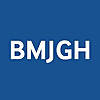
BMJ Global Health
22 FOLLOWERS
BMJ Global Health is an open-access journal publishing high-quality peer-reviewed content relevant to those involved in global health. The journal covers all aspects of global health, and the editor welcomes opinionated discussions to stimulate discussion and debate.
BMJ Global Health
1w ago
Introduction
Digital adherence technologies (DATs), such as phone-based technologies and digital pillboxes, can provide more person-centric approaches to support tuberculosis (TB) treatment. However, there are varying estimates of their performance for measuring medication adherence.
Methods
We conducted a systematic review (PROSPERO—CRD42022313526), which identified relevant published literature and preprints from January 2000 to April 2023 in five databases. Studies reporting quantitative data on the performance of DATs for measuring TB medication adherence against a reference standard, with ..read more
BMJ Global Health
2w ago
BMJ Global Health
2w ago
Introduction
As timeliness metrics gain traction to assess and optimise outbreak detection and response performance, implementation and scale-up require insight into the perspectives of stakeholders adopting these tools. This study sought to characterise the feasibility and utility of tracking One Health outbreak milestones across relevant human, animal, plant, and environmental sectors to systematically quantify timeliness metrics in Uganda, a country prone to outbreaks of WHO priority diseases.
Methods
A database of outbreak events occurring in Uganda between 2018 and 2022 was compiled. Outb ..read more
BMJ Global Health
2w ago
BMJ Global Health
2w ago
Introduction
The relative priority received by issues in global health agendas is subjected to impressionistic claims in the absence of objective methods of assessment of priority. To build an approach for conducting structured assessments of comparative priority health issues receive, we expand the public arenas model (2021) and offer a framework for future assessments of health issue priority in global and national health agendas.
Methods
We aimed to develop a more comprehensive set of measures for conducting multiyear priority comparisons of health issues in six agenda-setting arenas by ide ..read more
BMJ Global Health
3w ago
Introduction
Reviewing and updating research priorities is essential to assess progress and to ensure optimal allocation of financial and human resources in research. In 2001, WHO held a research priority setting workshop for herpes simplex virus type 2 (HSV-2) research in low-income and middle-income countries (LMICs). This study aimed to describe progress between 2000 and 2020 in three of the five key research priority areas outlined in the workshop: HSV-2/HIV interactions, HSV-2 control measures and HSV-2 mathematical modelling. The remaining priorities are addressed in a companion paper.
M ..read more
BMJ Global Health
3w ago
Institutional capacity for doctoral training is key to addressing the complex challenges facing the global south. In the context of the need for skilled knowledge workers in health systems and growing demand for doctoral places, we reflect on the evolution of a public health doctoral programme in a South African School of Public Health. Through this case, we aim to contribute to wider debates on the form and content of emerging public health doctoral programmes in South Africa and the African continent. Drawing on a multi-level framework of ‘curriculum responsiveness’ we consider responsive pu ..read more
BMJ Global Health
3w ago
Background
Co-creation is seen as a way to ensure all relevant needs and perspectives are included and to increase its potential for beneficial effects and uptake process evaluation is crucial. However, existing process evaluation frameworks have been built on practices characterised by top-down developed and implemented interventions and may be limited in capturing essential elements of co-creation. This study aims to provide a review of studies planning and/or conducting a process evaluation of public health interventions adopting a co-creation approach and aims to derive assessed process ev ..read more
BMJ Global Health
3w ago
Rationale
A small number of earlier studies have suggested an effect of temporary abstinence campaigns on alcohol consumption. However, all were based on self-reported consumption estimates.
Objectives
Using a time series of 23-year monthly alcohol sales data, this study examined the effect of an annual temporary abstinence campaign, which has been organised annually since 2003 during the Buddhist Lent period (spanning 3 months), on population-level alcohol consumption.
Methods
Data used in the analysis included a time series of monthly alcohol sales data from January 1995 to September 2017 an ..read more
BMJ Global Health
3w ago
Introduction
Equitable inclusion of low-income and middle-income country (LMIC) researchers and women in research authorship is a priority. A review of progress in addressing WHO-identified priorities provided an opportunity to examine the geographical and gender distribution of authorship in herpes simplex virus type-2 (HSV-2) research.
Methods
Publications addressing five areas prioritised in a WHO workshop and published between 2000 and 2020 were identified. Data on author country, gender, authorship position and research funding source were collected by manuscript review and internet searc ..read more